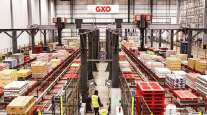Freight Brokers Using Technology to Automate Processes

PALM DESERT, Calif. — Automation isn’t just for trucks. There was plenty of evidence at the Transportation Intermediaries Association Capital Ideas conference and exhibition here that it’s also going to change the way freight is managed by shippers and third-party logistics companies.
At a session on emerging technologies in shipping hosted by Ramona Hood, vice president of freight management at FedEx Supply Chain, a panel of experts offered their views on what the future will look like.
Data flowing from computers to computers will eliminate the need to use telephones to match loads with truck capacity, and sensors will track shipments in real time, according to Scott Moscrip, founder of freight matching firm Truckstop.com.
Uses of new technology will vary depending on the type of freight and the needs of customers, and Moscrip’s advice is to “take it one step at a time.”
New software applications will create viral networks that will allow shippers and carriers to collaborate as never before, said Tom Heine, CEO of Aljex Software.

A view of the Aljex booth on the TIA exhibit hall floor. (Daniel P. Bearth/Transport Topics)
“There’s a ton of new apps,” Heine noted. “And they are making the systems we have now more powerful.”
Digital networks between trusted partners will make freight procurement automatic and proactive, according to Noam Frankel, a member of the team that launched pioneering freight brokerage firm American Backhaulers and now is CEO of a start-up called FreightFriend.
“Finding trucks is still too labor intensive,” Frankel said. “The stage is set for digital freight capacity exchanges.”
Revenue generated by the most productive brokerage sales personnel will increase by three or four times through the use of automation and data analysis, said Robert Nathan, co-founder and CEO of Chicago-based broker LoadDelivered.
“The days of ‘quota math’ are over,” Nathan said.
RELATED: TIA Chairman Jason Beardall wants to reach out to shippers
Blockchain technology will make freight transactions bullet proof and provide visibility for all participants in the supply chain, said Jason Kerner, vice president of sales engineering at Project 44, a software firm that provides digital links between shippers, carriers and third-party logistics companies.
With at least 70 blockchain frameworks under development, Kerner said he expects the field to be narrowed to as few as 10 and advised companies to chose carefully and pick systems that have support from major companies.
Outside the room where these visions were being discussed, scores of vendors were offering technology to make those visions a reality.
A large number of firms are trying to help brokers find carriers more efficiently by gathering and analyzing data from carriers, drivers and other industry sources.
“Brokers get input from trucking companies every day,” said Kyle Wilson, director of customer success at Cargo Chief in Millbrae, Calif. “That’s gold that no one’s mining.”
RELATED: Economist Noel Perry says strong freight market, driver shortage won’t last
CX North America Information Services, based in Tecumseh, Ontario, showcased its software platform and mobile app that pulls data from over a dozen telematics providers, transportation management systems and drivers to track loads and communications between brokers, 3PLs and carriers.
Prasad Gollapalli, CEO of Reston, Va.-based Trucker Tools, said the company recently signed its 50th customer and reached a milestone of 500,000 downloads of its mobile app since releasing its Smart Capacity platform in September 2017.
“We are enabling the broker to work faster, better and smarter,” Gollapalli said.
Terry Wood, vice president of business development for Intelek Technologies Corp., said his company, which provides electronic data interchange services, has developed a service that aggregates data from carrier websites and e-mail and matches it with rating engines to speed up the process of finding load matches.
The company also has developed processes for automating collection of fuel inventories for bulk transporters and “kill sheets” for livestock haulers.
“It’s shocking the number of firms that are not automated,” Wood said.
Jon Lansangan, a technical sales engineer at Teknowlogi, said his company is adding mobile applications to existing transportation management systems to enable automated dispatch and tracking of freight.
Logistical Labs, a Chicago-based company that helps analyze supply chain data, released BidDex, a product that improves the way freight bids are managed by hosting bids, analyzing pricing and managing awards in one place.
“It effectively removes spreadsheets from the process,” said Chris Ricciardi, chief operating officer.
On April 6, Truckstop.com announced that it will integrate its load board network with Banyan Technology to provide shippers, brokers and 3PLs with greater visibility into the truckload spot market.




